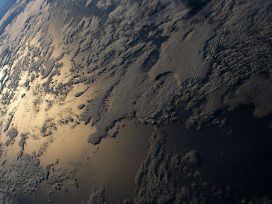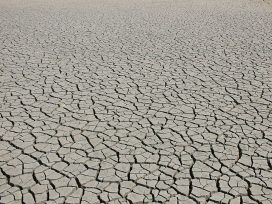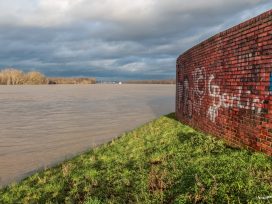Who is failing the climate? Are underreporting journalists, politicians in denial or fatalists, who insist that only the most aggressive few can survive, at fault? Are horrified white boys or an industrial complex that capitalize on this misery more to blame? The list of potential culprits may be long, but the ultimate raft of solutions needs to be even longer. Hysterics do not help, long-time activists remind. A complex collapse cannot possibly be tackled without doing away with the stereotype that the environment is only important for the white, middle-class. The colonized and exploited must have a voice and introduce positions on the problem. An enforced cooling down of the coronavirus crisis may as well offer a window of opportunity for a transition from an economy of exploitation and disposal towards fulfilling the needs of the many.
Are ecological crises inevitable? Eurozine looks at the cultural and political factors behind delayed responses to the climate emergency, and potential ways out of it.
This focal point is published with the support of Studio Europa Maastricht.

In collaboration with

Treasure trove or rubbish dump? In either case, oceans are being spoiled. Concepts from ‘mare liberum’ to ‘common heritage’ don’t safeguard the blue planet’s largest frontier from escalated seabed mining, industrialised fishing and waste disposal, nor global inequality and racialized violence. Could a democratic World Ocean Authority be the answer?

Faced with energy scarcity exacerbated by war, EU member states are turning to solutions that are environmentally damaging and not affordable for all. Could ‘energy sobriety’, a form of rationing and progressive pricing, be a socially just way of managing a necessary reduction in energy use?

Running dry
Protecting the right to water in Europe
Water privatization has catastrophic results, as shown by France and the United Kingdom. Citizens across Europe are increasingly opposed to the liberalization of essential services. But with climate change worsening droughts and heatwaves, public ownership is only the first step towards just and effective water management.

Ups and downs of degrowth
springerin 3/2022
‘springerin’ on how the art world is coping with downgrading in a climate where ‘bigger is better’, re-engaging with the material world and dealing with the ‘big boys and their extractivist toys’.

The planet, as authoritarian capitalism’s plaything, is subject to real-world economic-ecological downward spirals. And yet exorbitant space exploration projects continue to build escapist dreams on extractivism. And the threat of nuclear war continues to push at the limits of tenuous environmental stability.

Climate change affects us all yet not equally. The plight of those forced to migrate as a result – often called ‘climate refugees’, though not officially – has become contested ground between human rights/environmental activists and anti-asylum lobbyists. Could ‘ecologically displaced’, avoiding racialization, xenophobia and division, be a viable alternative?

North Sea oil voyage
Contemporary art and the environment
The global trade in fossil-fuels is proving to be far from simple business. In Norway, which almost entirely generates its internal electricity supply from renewable sources, oil has become dirty laundry. But what can turn national embarrassment into real change? Can art as comment apply just the right amount of social pressure?
Tackling climate change requires more care. Environmentalist slogans demand respect for Mother Earth. But does it make sense to gender a planet? How should nature be perceived? And what does ‘natural’ even mean within an ecofeminist frame?
A bill on Animal Welfare is currently making its way through the UK parliament. If passed, non-human vertebrates would be recognized as sentient. But would this mean that animals have the same or similar rights to humans?
COP26’s mandate focuses on averting the loss and damage caused by climate change. And technological solutions hold much promise. But high-tech and the environment aren’t always best matched: largely unregulated mega satellite projects are on the increase with space debris a real near-space threat.
COP26 lists collaboration as one of its main objectives. All views are seemingly welcome. And yet environmental justice, the law-making that should speak for Indigenous people, isn’t explicitly on the table. If laws and legal action remain static, based on corporate culpability after the fact to the exclusion of motive and context, how will future environmental plunder ever be avoided?
A European elephant in the room
On public space, ecology and the lands of Europe: a conversation with Tim Flannery
Europe has never been a place for racial or environmental purity. Situated at a crossroads of the world, it has always been characterized by change and hybridisation. Palaeontologist Tim Flannery calls for reinventing the commons and bringing elephants back to Europe.
Istanbul’s water reserves are drying up: increasingly severe droughts, intense urban development and the growing population all have their impact. With no miracle cure in sight, environmental science looks for proven ways to reduce water loss in times of scarcity.
An ode to Marmara
What lies below the sea snot spectacle
Once the heart of a civilization, the inland sea connecting Europe and Asia has lost most of its astonishing wildlife and is suffocating under marine mucilage. Industrial pollution and reckless sewage policies feed the phytoplankton that took over the sea. Kaya Genç recalls the rich history of his beloved Marmara and identifies the culprits behind its rapid demise.
A patch of moonlight
Darwin's warning
Wildlife conservationists often have to risk their own safety to protect endangered species from armed gangs. The market value of Asian elephant tusks, for example, entices certain impoverished locals into poaching. And at the crux of this perilous and twisted Anthropocene reality lies an increasingly aggressive animal’s fight for survival.








